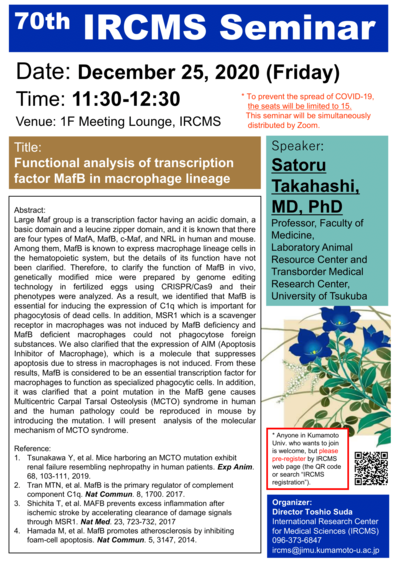- HOME
- IRCMS Seminars
- [Dec.25] 70th IRCMS seminar
IRCMS Seminars
[Dec.25] 70th IRCMS seminar
November 25 2020
We would like to inform you that the 70th IRCMS seminar has been scheduled as below.
We would be pleased to see many of you participating in the seminar.
Date : December 25, 2020 (Friday)
Time : 11:30-12:30
* To prevent the spread of COVID-19, the seats will be limited to 15.
* This seminar will be simultaneously distributed by Zoom.
Speaker : Satoru Takahashi, MD, PhD
Professor, Department of Anatomy and Embryology, Faculty of Medicine,
Laboratory Animal Resource Center (LARC) and Transborder Medical Research Center (TMRC),
University of Tsukuba
Tilte : Functional analysis of transcription factor MafB in macrophage lineage
Abstract:
Large Maf group is a transcription factor having an acidic domain, a basic domain and a leucine zipper domain, and it is known that there are four types of MafA, MafB, c-Maf, and NRL in human and mouse. Among them, MafB is known to express macrophage lineage cells in the hematopoietic system, but the details of its function have not been clarified. Therefore, to clarify the function of MafB in vivo, genetically modified mice were prepared by genome editing technology in fertilized eggs using CRISPR/Cas9 and their phenotypes were analyzed. As a result, we identified that MafB is essential for inducing the expression of C1q which is important for phagocytosis of dead cells. In addition, MSR1 which is a scavenger receptor in macrophages was not induced by MafB deficiency and MafB deficient macrophages could not phagocytose foreign substances. We also clarified that the expression of AIM (Apoptosis Inhibitor of Macrophage), which is a molecule that suppresses apoptosis due to stress in macrophages is not induced. From these results, MafB is considered to be an essential transcription factor for macrophages to function as specialized phagocytic cells. In addition, it was clarified that a point mutation in the MafB gene causes Multicentric Carpal Tarsal Osteolysis (MCTO) syndrome in human and the human pathology could be reproduced in mouse by introducing the mutation. I will present analysis of the molecular mechanism of MCTO syndrome.
- Tsunakawa Y, et al. Mice harboring an MCTO mutation exhibit renal failure resembling nephropathy in human patients. Exp Anim. 68, 103-111, 2019.
- Tran MTN, et al. MafB is the primary regulator of complement component C1q. Nat Commun. 8, 1700. 2017.
- Shichita T, et al. MAFB prevents excess inflammation after ischemic stroke by accelerating clearance of damage signals through MSR1. Nat Med. 23, 723-732, 2017
- Hamada M, et al. MafB promotes atherosclerosis by inhibiting foam-cell apoptosis. Nat Commun. 5, 3147, 2014.
Anyone in Kumamoto University who wants to join is welcome; however, please pre-register by the following URL to secure your seat or receive the Zoom meeting information.
http://ircms.kumamoto-u.ac.jp/symposium_reserve/symposium/reservation/
Flyer: (Click for a larger image)

